- Home
- Newt Gingrich
A Nation Like No Other Page 4
A Nation Like No Other Read online
Page 4
Crucially, Locke maintained that the social contract, as it was formed willingly, can be dissolved freely when the government no longer abides by its terms.
When any one, or more, shall take upon them to make laws, whom the people have not appointed so to do, they make laws without authority, which the people are not therefore bound to obey; by which means they come again to be out of subjection, and may constitute to themselves a new legislative, as they think best, being in full liberty to resist the force of those, who without authority would impose any thing upon them. Every one is at the disposure of his own will, when those who had, by the delegation of the society, the declaring of the public will, are excluded from it, and others usurp the place, who have no such authority or delegation.
French philosophes such as Montesquieu, Diderot, and Voltaire further refined the notion of personal sovereignty and popular sovereignty, as did the thinkers of the Scottish Enlightenment. The Founders distilled all these disparate influences into a “liberal philosophy” that emphasized the personal sovereignty and dignity of the individual. As Bailyn explains, “Borrowing from more original thinkers, they were often, in their own time and after, dismissed as mere popularizers. Their key concepts—natural rights, the contractual basis of society and government, the uniqueness of England’s liberty preserving ‘mixed’ constitution—were commonplace of liberal thought at the time.”6
Though commonplace at the time, these ideas were expressed in the Declaration of Independence with such clarity and conviction that the document would give birth not only to a country, but to an ethos that, to this very day, resonates throughout the world.
ENGLAND’S FIRST VENTURES IN AMERICA
Though they regarded themselves as British, the Founders were conscious of their special status in the New World. They were the progeny of refugees, immigrants, utopians, and frontiersmen, living free from many of the ancient artifices and institutions of Europe, with the opportunity to import social structures or invent their own. For them, the intuitive claims of history could be reasoned and tested against rival notions before being accepted. America in effect became a great laboratory for experimentation.
The initial colonists’ successes and failures gave rise to an American way of thinking about how to confront challenges, adapt, survive, and thrive. Alongside its European philosophical influences, the Declaration of Independence also reflected the colonists’ unique struggles and the resulting worldview that affirmed self-reliance and individual responsibility in the face of utterly new circumstances.
The first English settlement in the American colonies was an abject failure, providing a valuable lesson for future efforts. The settlement at Roanoke under Sir Walter Raleigh in the 1580s had confused aims, feuding leaders, and unprepared participants. Furthermore, as historian Paul Johnson notes, Roanoke “had no religious dimension ... [no] God-fearing, prayerful men”7—a crucial quality that infused other, successful settlements with a common purpose. Amidst debilitating infighting, the expedition’s fleet simply sailed off without the colonists. War with Spain and the invasion of the Spanish Armada prevented their re-supply, and the colonists vanished before a return expedition arrived.
The Founding Fathers took inspiration from the hard-won success of the two subsequent English colonies in the New World, at Jamestown and Plymouth Plantation. Although the two colonies had different aims, comprising capitalist adventurers and Christian idealists, respectively, both groups were convinced that England, like Biblical Israel, was endowed with a special destiny by God—and as new Israelites, the settlers sought out their own land of milk and honey. Moreover, both settlements overcame initial misdirection from London and developed similar traditions and values emphasizing industriousness, self-reliance, and Godliness. These traits grew into a new, American worldview that found expression in America’s founding documents.
JAMESTOWN
The Virginia Company of London founded the colony of Jamestown on the James River in Virginia in 1607. The initial financing was entirely from private investors, with settlers promised freehold land in return for seven years of communal labor for the colony. When the first settlers landed, they quickly built a church, signaling their common purpose.
The harsh environment and dwindling supplies took a heavy toll on the settlers, who became increasingly listless and undisciplined. Unprepared for the physical hardships and demotivated by the requirement for communal labor, many of them moved elsewhere. The deteriorating situation was first reversed when John Smith, who had been elected by popular vote to head the Jamestown Council, announced new work rules. Smith decreed:You must obey this now for a Law, that he that will not worke shall not eate (except by sickness he be disabled:) for the labors of thirtie or fortie honest and industrious men shall not be consumed to maintaine an hundred and fiftie idle loyterers.8
Smith’s order, alluding to the Biblical passage 2 Thessalonians 3:10, repudiated the colony’s initial feudal structure under which “high-born” colonists had refused to perform much manual labor. It was a profoundly democratic directive and a dramatic breakthrough for equality, as each man was expected to contribute or perish.
But John Smith was injured and had to return to England in 1609, after only eighteen months in Virginia. Once he departed, conflict with the local Indians combined with demotivating work rules led to a “starving time” during the winter of 1609–1610 that took the lives of all but sixty of the 500 colonists.
The colony was revived when a new “high marshal,” Sir Thomas Dale, arrived in 1611 and encouraged individual initiative by establishing private property rights to individual plots of land. Several years later another settler, John Rolfe, pioneered tobacco cultivation, setting the colony on the road to prosperity. In 1619, Jamestown adopted governance on republican principles with a representative and responsible “House of Burgesses” that met in the Jamestown church. Emphasizing the rule of law and a self-governing ethic, the colony affirmed unique principles of liberal governance that dramatically differentiated it from Europe.
PLYMOUTH
As the Jamestown settlers struggled against the elements, the Pilgrims—a congregation of dissenters and separatists from the Church of England—received a charter to establish their own foothold in America. In 1620, the Pilgrim fathers penned an early draft of the American Creed while en route to the New World on the Mayflower. Having veered off-course from their destination in Virginia, some of the would-be colonists asserted the change-of-course had voided the king’s charter, necessitating a new contract. In the Mayflower Compact, the Pilgrims mutually agreed to a social contract binding themselves together under God. Plymouth Colony’s governor, William Bradford, preserved the pledge:In the name of God, Amen. Having undertaken, for the Glory of God and advancement of the Christian Faith and Honour of our King and Country, a Voyage to plant the First Colony in the Northern Parts of Virginia, do by these presents solemnly and mutually in the presence of God and one of another, Covenant and Combine ourselves together into a Civil Body Politic, for our better ordering and preservation and furtherance of the ends aforesaid; and by virtue hereof to enact, constitute and frame such just and equal Laws, Ordinances, Acts, Constitutions and Offices, from time to time, as shall be thought most meet and convenient for the general good of the Colony, unto which we promise all due submission and obedience.9
Wholly independent of the Jamestown colony, the Pilgrims established their settlement in Plymouth, Massachusetts, on democratic and egalitarian principles and the rule of law. Their framework set a precedent for future frontier agreements and was a radical departure from the European model, as no institutions but God and king preceded their compact.
The Plymouth Pilgrims had much in common with the settlers in Virginia, but they departed from the Jamestown model in a crucial respect: their efforts would be dedicated to glorifying God. To the Plymouth settlers, the colony would represent an uncorrupted ideal, serving as an example to the decadent, fallen, and unreformed. Their compac
t and ensuing laws were modeled not on the principles of English liberties, but on the covenant between God and the Israelites.
The radical principles of governance based on consent and equality boded well for the colony. But as in Jamestown, the Pilgrims learned the hard way that without the proper incentives for work even a project comprised of godly men was doomed. Amidst poor harvests and spreading unrest, William Bradford scrapped the communal living and work rules, which had been imposed by the Virginia Company in London, and granted private freehold title to land directly to family units. The colonists’ natural industriousness and ingenuity quickly re-emerged.
The leader of the follow-on Massachusetts Bay Colony, John Winthrop, also saw his project as a fundamentally redemptive one, an opportunity to start the world anew in the unspoiled wilderness. Plymouth Plantation, like Jamestown, enjoyed de facto self-government through distance and circumstance,10 but the colony’s founders managed to get a charter approved in 1629 that required no oversight meetings in London, giving the Massachusetts Bay Colony great legal flexibility. The self-governing principle, along republican and religious lines, clearly imbued the Bay Colony, which Winthrop, drawing from Jesus’ Sermon on the Mount, proclaimed to be “as a City upon a Hill,” adding “The eyes of all people are upon us.” In Winthrop’s terms, America was an exemplar burdened with history’s judgment. The American Creed was coming into focus as a principled exception to European models of governance.
Despite their democratic procedures, neither Plymouth Plantation nor the Bay Colony in Boston were bastions of liberty. Pilgrim leaders governed Plymouth like a theocratic dictatorship, and the Bay Colony banished Quakers and other religious dissenters.
One dissenter expelled from the Bay Colony was the Baptist Roger Williams, who later established a separate colony in Rhode Island that affirmed the radical precept of religious liberty. Along the Williams model, more colonies based on religious tolerance emerged in British North America, such as Lord Baltimore’s Catholic haven in Maryland (founded in 1634) and William Penn’s Quaker-led colony in Pennsylvania (founded in 1682). All the while, the frontier beckoned liberty-seeking pioneers, offering a new social contract along less rigid lines of religious or political control. The space of the New World, as much as political and religious doctrine, made America home to liberty.
Notably, these experiments in self-government preceded the high-minded theories of Rousseau, Locke, and Hobbes. Locke, whose ideas would ring through the Declaration of Independence, was himself strongly influenced by the American colonial experience in crafting his ideas on the social contract and natural liberty.11 Remarkably, America helped to spread ideas of liberty far before its independence.
UNITY UNDER GOD
Though the various American colonies had similar governing principles based on man’s equality and personal sovereignty, by the close of the seventeenth century the colonies featured highly diverse political structures and economies. From British Army general James Oglethorpe’s debtors’ haven in Georgia to Virginia’s plantation culture to New York’s commercial hub, the colonies developed their own traditions and modes of life. Religious practice was particularly diverse; though a fraction of Britain’s size, the combined colonies had hundreds of faiths evangelizing and growing aggressively in the spiritual free market of America, in stark contrast to Britain’s thirty socially proscribed “non-conformist” sects.12
The transformation of the disparate colonial cultures into a common American identity occurred through a massive religious revival that began in the 1730s. As John Adams noted, “But what do we mean by the American Revolution? Do we mean the American war? The Revolution was effected before the war commenced. The Revolution was in the minds and hearts of the people: a change in their religious sentiments of their duties and obligations.”13
Adams was referring to the Great Awakening, which swept from small New England towns through the mid-Atlantic ports and southern agrarian outposts. The movement, which de-emphasized religious ceremony and stressed an intense, emotional, and individual relationship with God, further democratized religion, as independent sects flourished, religious education became personalized, and crucially, “New Light” believers abandoned the government-established Church of England in droves. A key leader of the Awakening was the revivalist George Whitefield, who visited every colony in English North America, delivering an estimated 18,000 spellbinding sermons from the 1730s until his death in 1770. Whitefield’s efforts were assisted by Benjamin Franklin, who became a friend of Whitefield’s, though not a convert, and reprinted at great profit Whitefield’s sermons in his newspaper.
True liberty had come to mean freedom of faith and conscience, while religion was deemed necessary to support liberty, a gift of God. The purpose of liberty was to give glory to God. If God was forsaken, liberty’s purpose would be destroyed, and liberty itself would give way to tyranny. In the words of Gouverneur Morris, a key contributor to the U.S. Constitution, “Religion is the only solid Base of morals and Morals the only possible Support for free governments.”14
The Great Awakening had a deep, unifying effect on the American colonists. As Paul Johnson writes, the Awakening “taught different colonies, tidewaters and piedmonts, coast and up-country, to grasp and appreciate what they had in common, which was a very great deal.”15 With their common experiences, values, and beliefs, the colonists were transforming into a nation.
The New World, though created by men of the Old World, birthed wholly new expressions of ancient ideas. The American experience taught the Founders that self-government was not only possible, but effectual and just—that God’s gifts of life and liberty were universal and good. These ideas had been bandied about in European universities and salons for centuries, being refined and debated by high-minded scholars, but they were made real by the citizens of the primitive townships of colonial America. The New World, as much as the Old, wrote the American Creed.
By the time that creed was codified in the Declaration of Independence, it was already widely known and understood, from Boston to Savannah. For the tinkers, farmers, soldiers, and cobblers in New York who heard it read aloud as the British Navy lurked off Staten Island, the source of their rights was self-evident. They were free and godly men, equal in God’s eyes and self-sufficient in life. The natural rights of the Englishmen, derived from the Reformation, Enlightenment, and constitutional settlements, had now passed on to the colonists.
The Declaration of Independence was not radical in thought but in action. It took bold steps to enshrine these sacred principles as the basis of a new country. With the Declaration, America set itself apart, an exception from the ways of the other nations of the world, and embarked on a radically new course in history, in pursuit of neither wealth, nor power, nor racial or ethnic purity, but an idea: God-given liberty for all.
CHAPTER TWO
HABITS OF LIBERTY THE SHIELD OF THE AMERICAN REVOLUTION
As the delegates to the Constitutional Convention were completing their work, Benjamin Franklin reportedly walked outside and encountered a woman who asked him, “Well, Dr. Franklin, what have you done for us?” Franklin responded, “My dear lady, we have given to you a republic—if you can keep it.”1
In a single sentence, Dr. Franklin summed up the extraordinary drama that would play out for all of American history between the two vital forces that sustain American Exceptionalism: freedom and responsibility.
In 1787, the American people created a government that maximized individual freedoms. In order to guard against the growth of unchecked federal power, the Founders carefully designed a republic that divided this power among three separate but co-equal branches of a central government of limited powers, with each having the authority to check and balance the powers of the others.
Moreover, the Founders recognized that the effectiveness of these safeguards, and of the nation’s overall governmental structures, would ultimately depend upon the character of the American people. The people would have
to exercise responsibility, both for themselves and for their neighbors, if they were to keep a republican form of government and the freedoms it was designed to protect.
THE REPUBLIC WE WERE GIVEN
Notably, the Founding Fathers created a republic instead of a direct democracy. In a direct democracy, legislation is passed by a direct majority vote of all the people, whereas in a republic the people elect representatives who then pass legislation. In a direct democracy, the source of authority is the people. In a republic, the source of authority is the rule of law, which is typically codified in a constitution.
Understanding both the flawed nature of man and historical precedent, the Founders were adamantly opposed to direct democracy, fearing such a system would fail to protect true liberty and would allow for the “tyranny of the majority”—the scenario in which a majority can adopt unjust policies and oppress a minority of voters solely on the basis of their numbers. James Madison argued that “democracies have ever been spectacles of turbulence and contention; have ever been found incompatible with personal security, or the rights of property; and have, in general, been as short in their lives as they have been violent in their deaths.”2 According to John Adams, “[D]emocracy never lasts long. It soon wastes, exhausts, and murders itself. There never was a democracy yet that did not commit suicide.”3
The Founders, however, were also aware of the shortcomings of republics—especially their historical tendency to decay into aristocratic and tyrannical government, as was the case with the ancient Roman republic and with the English Parliamentary Commonwealth under Oliver Cromwell. They understood that previous republics had failed due to man’s susceptibility to the intoxicating temptations of power. As Sam Adams remarked, “The depravity of mankind [is] that ambition and lust of power above the law are ... predominant passions in the breasts of most men.”4

 1945
1945 Collusion
Collusion Trump's America
Trump's America Shakedown
Shakedown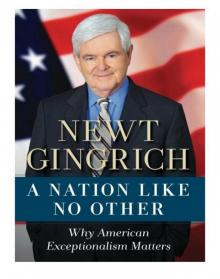 A Nation Like No Other
A Nation Like No Other To Try Men's Souls - George Washington 1
To Try Men's Souls - George Washington 1 Pearl Harbor: A Novel of December 8th
Pearl Harbor: A Novel of December 8th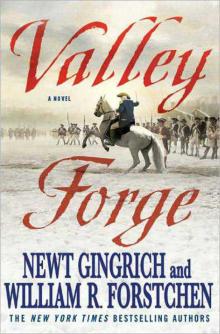 Valley Forge: George Washington and the Crucible of Victory
Valley Forge: George Washington and the Crucible of Victory To Save America
To Save America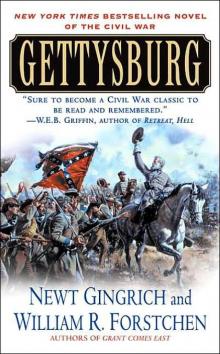 Grant Comes East cw-2
Grant Comes East cw-2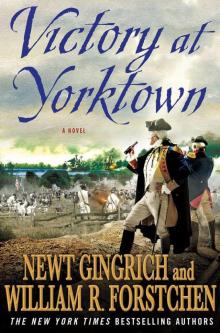 Victory at Yorktown: A Novel
Victory at Yorktown: A Novel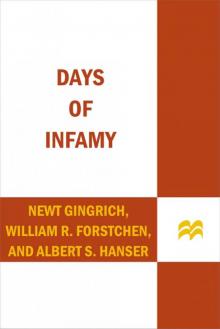 Days of Infamy
Days of Infamy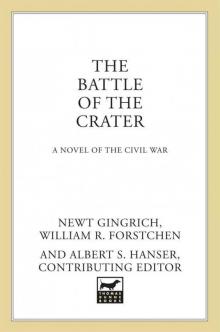 The Battle of the Crater: A Novel (George Washington Series)
The Battle of the Crater: A Novel (George Washington Series)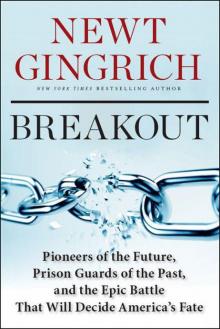 Breakout: Pioneers of the Future, Prison Guards of the Past, and the Epic Battle That Will Decide America's Fate
Breakout: Pioneers of the Future, Prison Guards of the Past, and the Epic Battle That Will Decide America's Fate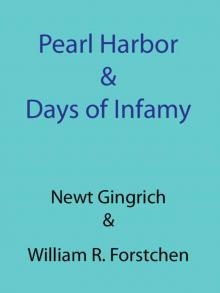 Pearl Harbour and Days of Infamy
Pearl Harbour and Days of Infamy Pearl Harbour - A novel of December 8th
Pearl Harbour - A novel of December 8th Understanding Trump
Understanding Trump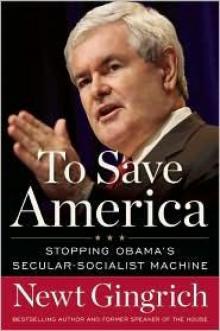 To Save America: Abolishing Obama's Socialist State and Restoring Our Unique American Way
To Save America: Abolishing Obama's Socialist State and Restoring Our Unique American Way